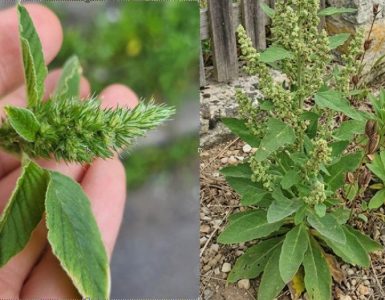Chicory (Cichorium intybus) is a versatile plant that has been used for centuries in various culinary and medicinal traditions. Known for its bitter leaves and bright blue flowers, chicory can be found growing wild in fields and roadsides or cultivated in gardens. While many people recognize chicory leaves as a common ingredient in salads or as a coffee substitute, few realize that the plant’s true treasure lies underground — in its roots.
The entire plant is edible, from the leaves to the flowers and even the seeds, but it’s the roots of chicory that hold the most potent health benefits and are used for various purposes around the world. Let’s explore why the roots of this often-overlooked plant are so valuable and how you can use chicory to enhance your diet and health.
Chicory Leaves and Their Culinary Uses
Chicory leaves are best known for their bitter taste, which makes them a popular addition to salads, especially in Mediterranean cuisine. The leaves can be eaten raw or cooked, and their bitter flavor pairs well with sweeter salad ingredients like apples, pears, and walnuts. Cooking chicory leaves helps to mellow out their bitterness, making them more palatable in dishes like sautés, stews, and soups.
Culinary Uses for Chicory Leaves:
Salads: Add raw chicory leaves to salads for a crisp texture and unique bitter taste.
Sautés: Lightly sauté the leaves with garlic, olive oil, and lemon juice to reduce bitterness and enhance flavor.
Soups and Stews: Use chicory leaves as a nutrient-rich green in soups and stews.
While the leaves are a great source of vitamins A, C, and K, as well as minerals like calcium and potassium, the real nutritional powerhouse of the chicory plant is its root.
The Magic of Chicory Roots: Why They’re So Important
Chicory roots are packed with health benefits that far outweigh those of the leaves. The roots have been used for centuries as a natural remedy for various ailments, and today they are gaining popularity as a prebiotic, coffee substitute, and dietary supplement. Here’s why chicory roots are so important:
1.Rich in Inulin — A Powerful Prebiotic
One of the key components of chicory root is inulin, a type of soluble fiber that acts as a prebiotic. Inulin promotes the growth of beneficial bacteria in the gut, which aids in digestion and supports overall gut health. Consuming chicory root regularly can improve your digestive system’s function, reduce constipation, and even enhance immune function by promoting a healthy gut microbiome.
Benefits of Inulin:
Improves digestion: Promotes the growth of healthy gut bacteria, reducing bloating and constipation.
Supports weight management: Inulin helps regulate appetite and can support weight loss by increasing feelings of fullness.
Balances blood sugar levels: Inulin has been shown to help stabilize blood sugar, making it beneficial for those with diabetes.
2.Natural Coffee Substitute
Chicory root has long been used as a coffee substitute, particularly in Europe and the southern United States. When roasted and ground, chicory root takes on a rich, dark flavor that is similar to coffee but without the caffeine. Many people enjoy chicory coffee for its smooth taste and health benefits, as it offers a caffeine-free alternative that supports digestion and gut health.
How to Make Chicory Coffee:
Roast chicory roots in the oven at a low temperature until they turn dark brown and become fragrant.
Grind the roasted roots into a fine powder, similar to ground coffee.
Brew the chicory root powder as you would regular coffee, either on its own or mixed with coffee beans for a unique blend.
3.Aids in Detoxification and Liver Health
Chicory root is known for its detoxifying properties, especially when it comes to liver health. The root contains compounds that support the liver’s natural detoxification processes, helping the body eliminate toxins more effectively. Regular consumption of chicory root may improve liver function and protect the liver from damage caused by toxins, alcohol, or medications.
Benefits for the Liver:
Detoxifies the body: Chicory root supports the liver’s ability to filter out toxins, promoting overall health.
Reduces inflammation: The anti-inflammatory properties of chicory root help protect the liver and other organs from inflammation-related damage.
Prevents fatty liver disease: Regular consumption of chicory root may help prevent or reduce the risk of developing non-alcoholic fatty liver disease.
4.Supports Heart Health
Chicory root can also play a role in maintaining a healthy heart. The inulin fiber found in chicory root has been shown to reduce levels of LDL (“bad”) cholesterol, which can help lower the risk of heart disease. Additionally, chicory root’s ability to promote a healthy gut indirectly benefits heart health by reducing inflammation and improving metabolic function.
Heart Health Benefits:
Lowers cholesterol levels: Inulin helps reduce LDL cholesterol, protecting the heart from cardiovascular disease.
Regulates blood sugar: Chicory root helps stabilize blood sugar, reducing strain on the heart and preventing spikes in insulin levels.
3.How to Harvest and Use Chicory Roots
Harvesting chicory roots is simple, especially if you have access to wild chicory plants or are growing them in your garden. The best time to harvest chicory roots is in the fall, after the plant has had time to store nutrients in its roots.
Steps to Harvest Chicory Roots:
Identify the Plant: Look for tall, blue-flowered chicory plants, either in the wild or in your garden.
Dig Up the Roots: Use a garden spade or shovel to dig around the base of the plant and gently lift the roots out of the soil.
Clean the Roots: Wash the roots thoroughly to remove any dirt or debris.
Dry or Roast the Roots: You can either dry the roots for later use or roast them to make chicory coffee.
Once harvested, chicory roots can be used in a variety of ways. You can roast and grind them for coffee, boil them into a tea, or even incorporate them into recipes for added fiber and nutrients.
4.Potential Side Effects and Considerations
While chicory root is generally considered safe for most people, it’s important to note that consuming large amounts of inulin can cause digestive discomfort in some individuals. Symptoms such as gas, bloating, or diarrhea may occur if too much chicory root is consumed at once. It’s best to start with small amounts and gradually increase your intake as your body adjusts.
Additionally, people with ragweed allergies may be allergic to chicory, as the plants are related. If you have a known allergy to ragweed, dandelions, or other plants in the Asteraceae family, consult your healthcare provider before consuming chicory root.
Chicory is an incredibly versatile plant, with every part offering valuable health benefits. While its leaves and flowers are popular in salads and herbal remedies, it’s the roots that truly stand out as a nutritional powerhouse. From promoting gut health and supporting liver function to serving as a caffeine-free coffee substitute, chicory root is an often-overlooked gem in the world of natural health. So, the next time you encounter chicory, remember that its roots are the most important part — and they might just become your new favorite addition to your daily routine.






Add comment